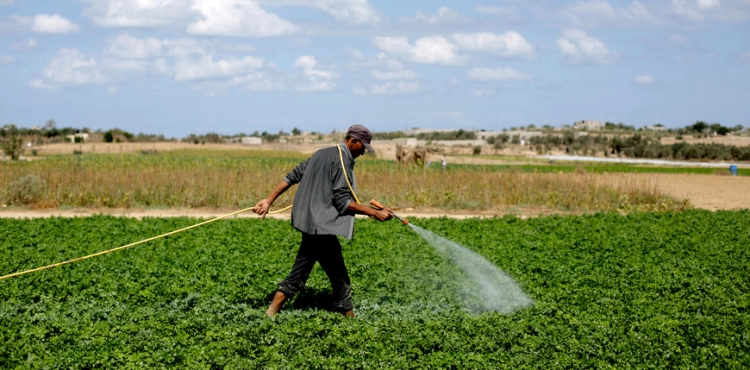The Agricultural Development Association (Agricultural Relief) has warned of the possibility of the collapse of the agricultural sector in the Gaza Strip and its deterioration in light of the successive crises that it is exposed to, unless the occupation´s crimes against the Gaza Strip, especially the siege and stopping the entry of fuel into the power plant, stop .
Agricultural Relief said that in the context of its daily follow-up and work among farmers, the spread of the new Corona virus has increased the suffering of farmers in the Gaza Strip, as they have a greater need for the availability of electricity and the consequent operations to operate wells and pump water to their crops and sterilize their farms and products.
Agricultural Relief expressed its deep concern over the real dangers that the agricultural sector is exposed to, which threatens the occurrence of disasters if they worsen and continue in this case, as the power cuts in the Gaza Strip last for 16 hours, and electricity reaches 4 hours during the day, and most times they are connected at night hours. What is difficult to take advantage of, especially for farmers who depend on electricity mainly to operate water wells and irrigate crops, as well as poultry breeders and hatcheries owners, and refrigerators preserving agricultural products, and fishing and keeping them in refrigerators.
What worries agricultural relief and workers in the agricultural sector is the exposure of Gaza´s farmers to successive crises. The prices of agricultural products in the local markets have been very low for months and do not cover the costs of their production. Agricultural work they often do not take into account.
Agricultural Relief believes that the continuing crisis of power cuts and the closure of the crossing will result in a shortage of fuel quantities and an increase in their prices. This crisis will also have repercussions on the various agricultural, plant, animal and fishing sectors.
According to the information collected by Agricultural Relief, the power outages in the plant production sector will lead to the stoppage of nearly 3000 water wells, which will increase the operational costs, because preparing the soil requires large quantities of water to activate the static pests and provide the appropriate conditions to stimulate it to exit the phase. Dormancy and restoration of activity in order to facilitate control and bring them under control, which reduces the potential for loss, as the lack of water in appropriate quantities affects sterilization materials and these materials will not be able to reach the appropriate depth to effectively control pests, which results in the growth of pests again after Agriculture, which in turn infects the plants and causes economic losses in the yield or raises the cost price.
The lack of water also causes young seedlings to become very thirsty after planting and die due to high temperatures, which requires replanting again and imposes direct losses on farms.
The livestock sector is affected by power cuts for long periods, as poultry keepers suffer from the availability of lighting and heating, and the blackout of 16 hours reduces the chickens´ intake of fodder, which affects their growth and the farmer is forced to increase the period of fattening, which doubles the cost and exposure to loss, and the power outage affects For long hours on the breeder of laying hens, as the lack of lighting affects the production of eggs.
Dairy cattle breeders suffer from a lack of electricity, especially as they depend on milking their cows using automatic electric milking parlor, and their inability to manual milking and their laziness in this leads to health damage to the cows as a result of congestion of the udder.
As for the fishermen, they face the problem of keeping the fish chilled in the refrigerators, and with distributors and shops, and the power cuts for long periods affect fish farming and fish kills as a result of the stopping of oxygen devices.
And she emphasized that the continuous power outage affects the work of women’s units and production, as there is a clear imbalance in the sequence and safety of the manufacturing process, starting from storing raw materials through manufacturing processes and ending with product storage and preservation, as electricity cuts occur during the morning periods, which are the periods in which the great majority work. For female units, to significantly reduce the production quantities of these units.
The suffering of the women´s units is evident in the post-industrial (storage) stage and the preservation of products from damage, which led the women´s units to destroy most of their products, and to overcome the problem of providing electricity through generators, it takes a high cost to buy fuel and increase the cost.
In order to remedy these crises and problems before their exacerbation and resulting from long hours of power outages, Relief believes that all efforts must be joined by workers in the agricultural sector to work to solve this problem, given its repercussions that threaten food security in the Gaza Strip in light of the possibility of the Corona epidemic spreading on a large scale from The Gaza Strip, and what will inflict environmental, social and health disasters into the Gaza Strip.
Agricultural Relief appealed to the international community to carry out its legal and moral duties by putting pressure on the occupation to lift the blockade on the Gaza Strip and allow free movement of goods and the entry of production supplies and components, including fuel, and to develop strategic solutions to the water crisis, fuel shortage and power outages.












